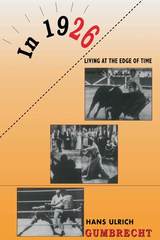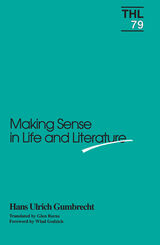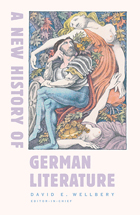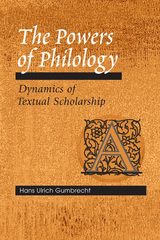
Travel back to the year 1926 and into the rush of experiences that made people feel they were living on the edge of time. Touch a world where speed seemed the very essence of life. It is a year for which we have no expectations. It was not 1066 or 1588 or 1945, yet it was the year A. A. Milne published Winnie-the-Pooh and Alfred Hitchcock released his first successful film, The Lodger. A set of modern masters was at work--Jorge Luis Borges, Babe Ruth, Leni Riefenstahl, Ernest Hemingway, Josephine Baker, Greta Garbo, Franz Kafka, Gertrude Stein, Martin Heidegger--while factory workers, secretaries, engineers, architects, and Argentine cattle-ranchers were performing their daily tasks.
Hans Ulrich Gumbrecht opens up the space-time continuum by exploring the realities of the day such as bars, boxing, movie palaces, elevators, automobiles, airplanes, hair gel, bullfighting, film stardom, dance crazes, and the surprise reappearance of King Tut after a three-thousand-year absence. From the vantage points of Berlin, Buenos Aires, and New York, Gumbrecht ranges widely through the worlds of Spain, Italy, France, and Latin America. The reader is allowed multiple itineraries, following various routes from one topic to another and ultimately becoming immersed in the activities, entertainments, and thought patterns of the citizens of 1926.
We learn what it is to be an "ugly American" in Paris by experiencing the first mass influx of American tourists into Europe. We visit assembly lines which turned men into machines. We relive a celebrated boxing match and see how Jack Dempsey was beaten yet walked away with the hearts of the fans. We hear the voice of Adolf Hitler condemning tight pants on young men. Gumbrecht conveys these fragments of history as a living network of new sensibilities, evoking in us the excitement of another era.

By the hundreds of millions we show up, stand in line, turn on, and tune in to watch, mesmerized, as athletes perform. And yet this experience, so widely craved and intensely felt, we commonly dismiss as “only a game.&rduqo; A book that looks beyond the usual explanations of why sports fascinates, In Praise of Athletic Beauty also strives for a language that can frame—even enhance—the pleasure we take in watching athletic events.
The vicarious thrill, anxiety release, competitive spirit: in place of these traditional answers to the mystery of sports’ allure, Hans Ulrich Gumbrecht proposes a more powerful and provocative alternative. The fascination with watching sports, he argues, is probably the most popular and potent contemporary form of aesthetic experience—in the classic, very literal sense of this concept. In exploring this idea, Gumbrecht develops a lucid reflection on the pleasures of sports spectatorship and the nature of athletic beauty. Where we might readily pronounce certain athletic moves and plays “beautiful,” this book gives us the means to explore, understand, and enjoy even more acutely the aesthetic experience that our words-in-passing barely suggest.
With a new perspective on the appreciation of—and, indeed, a new tone of praising—sports, Gumbrecht also offers a new way of narrating the history of athletics and a fresh vocabulary for analyzing various sports. Exploring athletic beauty, this book makes us understand the widespread passion sport inspires as an untamed form of aesthetic fascination.


The revolutionary spirit that animates the culture of the Germans has been alive for at least twelve centuries, far longer than the dramatically fragmented and reshaped political entity known as Germany. German culture has been central to Europe, and it has contributed the transforming spirit of Lutheran religion, the technology of printing as a medium of democracy, the soulfulness of Romantic philosophy, the structure of higher education, and the tradition of liberal socialism to the essential character of modern American life.
In this book leading scholars and critics capture the spirit of this culture in some 200 original essays on events in German literary history. Rather than offering a single continuous narrative, the entries focus on a particular literary work, an event in the life of an author, a historical moment, a piece of music, a technological invention, even a theatrical or cinematic premiere. Together they give the reader a surprisingly unified sense of what it is that has allowed Meister Eckhart, Hildegard of Bingen, Luther, Kant, Goethe, Beethoven, Benjamin, Wittgenstein, Jelinek, and Sebald to provoke and enchant their readers. From the earliest magical charms and mythical sagas to the brilliance and desolation of 20th-century fiction, poetry, and film, this illuminating reference book invites readers to experience the full range of German literary culture and to investigate for themselves its disparate and unifying themes.
Contributors include: Amy M. Hollywood on medieval women mystics, Jan-Dirk Müller on Gutenberg, Marion Aptroot on the Yiddish Renaissance, Emery Snyder on the Baroque novel, J. B. Schneewind on Natural Law, Maria Tatar on the Grimm brothers, Arthur Danto on Hegel, Reinhold Brinkmann on Schubert, Anthony Grafton on Burckhardt, Stanley Corngold on Freud, Andreas Huyssen on Rilke, Greil Marcus on Dada, Eric Rentschler on Nazi cinema, Elisabeth Young-Bruehl on Hannah Arendt, Gordon A. Craig on Günter Grass, Edward Dimendberg on Holocaust memorials.

For two and a half millennia philologists have viewed themselves as the modest heirs and curators of their textual past's most glorious periods, collecting and editing text fragments, historicizing them and adding commentary, and ultimately teaching them to contemporary readers.
Gumbrecht argues for a return to this tradition as an alternative to an often free-floating textual interpretation and to the more recent redefinition of literary studies as "cultural studies," which risks a loss of intellectual focus. Such a return to philological core exercises, however, can become more than yet another movement of academic nostalgia only if it takes into account the hidden desire that has inspired
philology since its Hellenistic beginnings: the desire to make the past present again by embodying it.
READERS
Browse our collection.
PUBLISHERS
See BiblioVault's publisher services.
STUDENT SERVICES
Files for college accessibility offices.
UChicago Accessibility Resources
home | accessibility | search | about | contact us
BiblioVault ® 2001 - 2024
The University of Chicago Press









